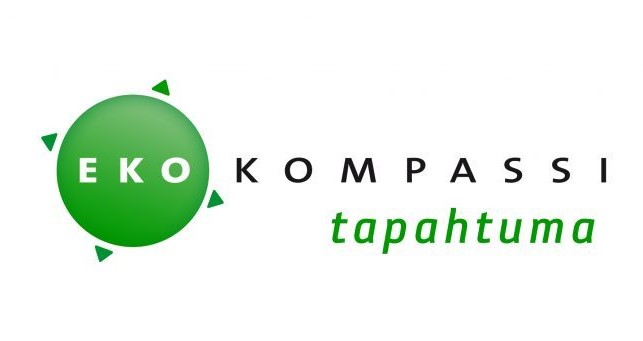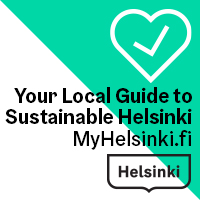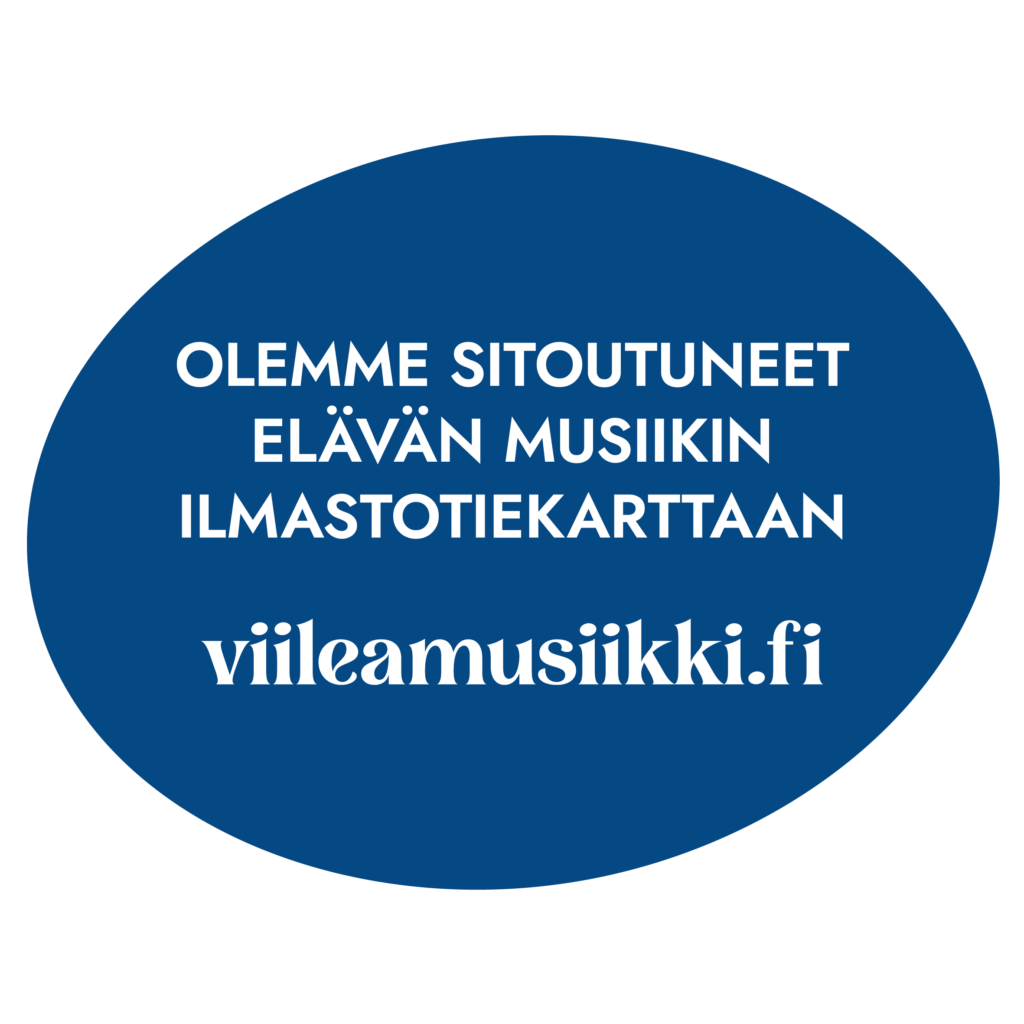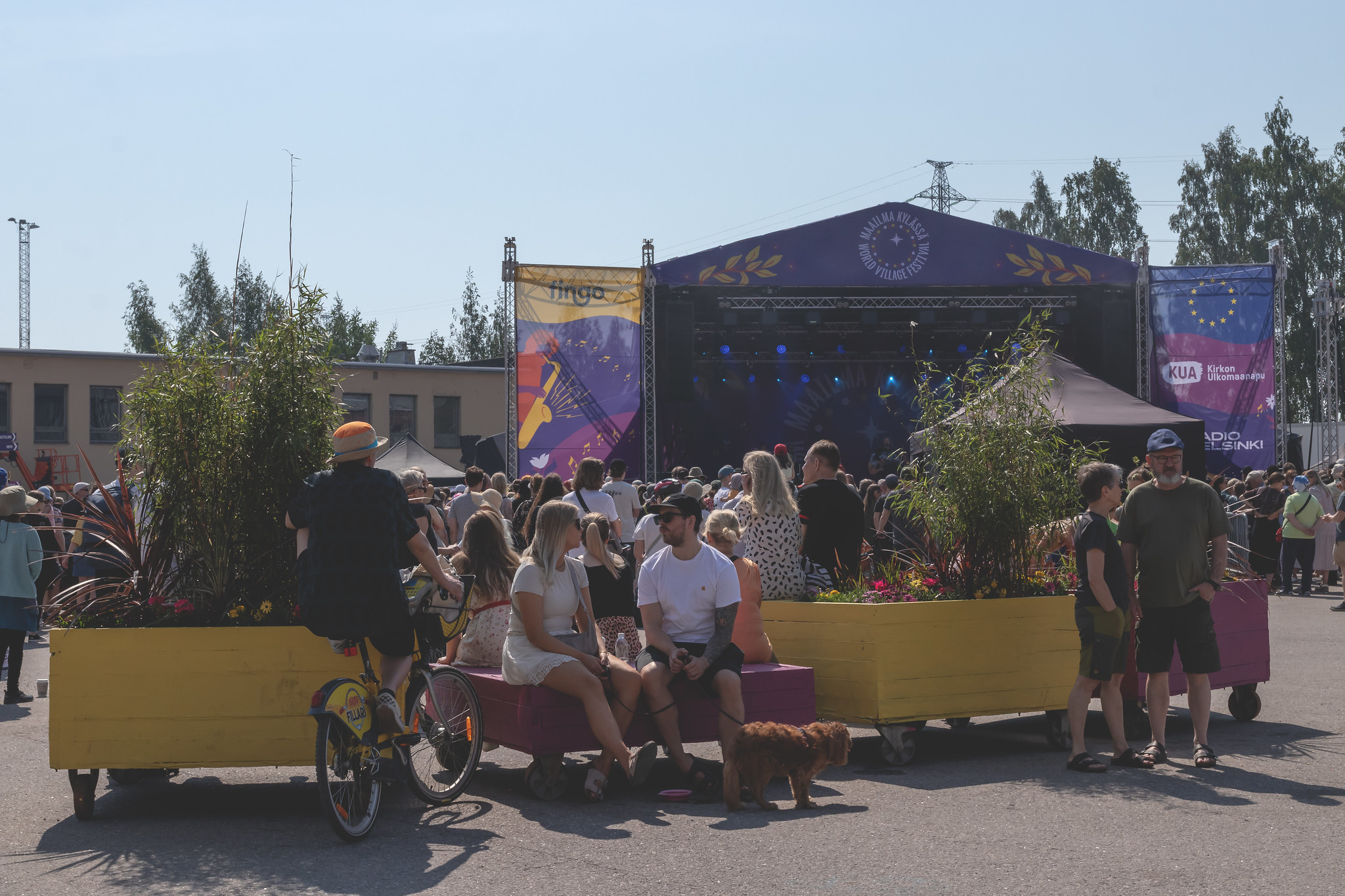World Village Festival is committed to continually improving its environmental efforts. Sustainable and responsible event production is important to us. Our aim is to make the festival’s carbon footprint as small as possible.
World Village Festival’s environmental work in a nutshell
- Starting from 2024, there will be only vegetarian food for sale at the festival.
- Festival is one of the first EcoCompass certified events in Finland.
- Flights of international artists coming to the festival are offset by donations to Finnish environmental organizations.
- The festival strives to minimize waste, including using long-lasting printed materials and allowing only recyclable containers.
- The festival is committed to the “Cool Music” commitment and the implementation of a live music climate roadmap.
Smaller carbon footprint
Vegetarian Food Only
Starting in 2024, there will be only vegetarian food for sale at the festival, eliminating meat, chicken, and fish. Serving vegetarian food helps us reduce our carbon footprint and promote environmentally friendly practices. Every food vendor at the festival commits to offering at least one vegan option. Backstage, only vegetarian food is available, and we prioritize Fair Trade products.
EcoCompass Certification
World Village Festival is one of the first EcoCompass-certified events (since 2013). Festival is committed to EcoCompass’ criteria, which include reducing and sorting waste, appointing an environmental supervisor, and maintaining an annually updated environmental plan. Through certification, World Village Festival commits to reducing its environmental impact and striving for improvement each year. Learn more about EcoCompass’ criteria on their website.
Cool Music Commitment
We have committed to the live music climate roadmap and have signed the Cool Music Commitment. Addressing the climate crisis requires swift action. We acknowledge the environmental impact of the music industry and work to reduce it. The live music climate roadmap outlines industry-wide climate goals, climate themes, and the roles and key impact opportunities for stakeholders in climate work. The goals are aligned with Finland’s 2035 and IPCC’s 1.5-degree climate targets. Learn more about the live music climate roadmap and sign the commitment.
Festival Area and Carbon Footprint Measurement
We continuously improve the festival. For example, the festival’s new location in Suvilahti allows for reduced construction, avoiding extensive transportation and emissions. The festival area is easily accessible by public transportation and cycling. Carbon footprint measurements for the festival are conducted at regular intervals. The last measurement was taken in 2015.
Environmental Acts
Compensations for Environmental Organizations
We address the festival’s environmental impact by various environmental compensations. For instance, 10% of the combined air travel expenses of international artists are annually donated to Finnish Development NGOs Fingo‘s member organisation’s environmental work.
We have also reduced the environmental impact of flights by decreasing the number of international artists at the festival. International artists primarily come to Finland from their European tours, reducing the need for long-haul international flights.
In 2023, we donated to the Dodo Association’s Gambia Tesito project. This project actively engages in forest conservation with a local partner, focusing on training local environmental authorities, NGOs, and villagers in the use of forest monitoring tools in Gambia, Senegal, and Guinea-Bissau. The goal is to enable local stakeholders to participate in cross-border forest conservation and cooperation. All activities are carried out in collaboration with Dodo’s local partner, the Freedom from Hunger Campaign (FFHC).
In 2022, we donated to the Siemenpuu Foundation. Siemenpuu accepts donations from individuals and companies looking to offset the environmental impact of air travel. Instead of compensation, Siemenpuu provides an opportunity to support the actions of Southern global organizations in protecting and sustainably using carbon-rich forest and coastal ecosystems and promoting a just transition away from fossil fuels.
In 2021, the festival was held virtually, and in 2020, it was cancelled, so there were no flights during those years.
In 2019, we directed our donation to the Finnish Association for Nature Conservation’s climate work and to Friends of the Earth Finland for their climate work in Finland and the Green Living Movement’s project in Zambia focused on mitigating and adapting to climate change.
Recycling
The World Village Festival is committed to recycling all waste associated with the event. The food utensils and dishes used at the festival are biodegradable, and the event banners are made from PVC-free and fully recyclable GeoMesh fabric. The ordering of printed materials is done with careful consideration, and the necessary products are ordered in an ecologically and as carbon neutral as possible manner. Pure Waste, the manufacturer of the volunteer shirts, produces its products from cutting waste from other clothing manufacturers.
Recycling advisors at the festival help visitors and exhibitors properly sort their waste at recycling points. We hope that participants’ enthusiasm for recycling extends beyond the festival weekend. For example, at the children’s area, workshops related to recycling and composting are organized, and the program often includes discussions, speeches, or workshops on climate, the environment, and sustainable development.
Together Towards a Better Environment
Festivalgoers can also play their part in supporting an environmentally friendly festival. Choosing vegetarian options, using recycling points, and bringing their water bottles are ways in which everyone can help make the festival more environmentally friendly. We encourage attendees to come to the festival using public transportation, bicycles, or on foot.
However, more important than small everyday actions is creating lasting change. The World Village Festival encourages every participant to act for a sustainable future. The festival provides an excellent opportunity to learn about the environmental activities of organizations, businesses, and other entities and discover new ways to support the environment or get involved in various organizations’ activities.
Fingo’s Society Commitment
The festival organizer, Fingo, has made an award-winning commitment to sustainable development. In this commitment, Fingo has pledged to promote sustainable development in all its activities. Fingo, for example, has committed to reducing its air travel emissions by half and decreasing the amount of paper printouts by 40%. Fingo has also committed to ensuring that at least half of the products and services it purchases are labelled with sustainability certificates.
Think Sustainably
World Village festival is part of City of Helsinki Think Sustainably programme. Together with Helsinki and several other events and businesses, the festival is committed to promoting a more sustainable way of life – for everyone.




